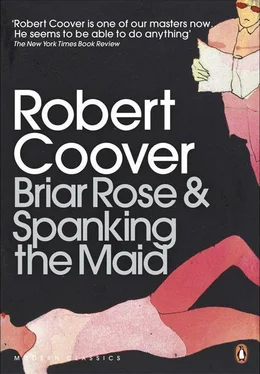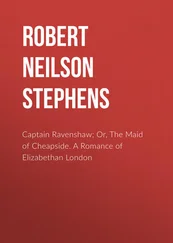Her prince has come. The real one. It is dark and she does not know where she is but she knows he has come and that it is he. She is filled with rejoicing, but also with trepidation. So much is at stake! She has known all along that her prince would come, but she has also known there would be no uncoming, forever after as much a threat as promised delight. What if he is not as she’s imagined him to be? She was safe inside this impenetrable castle, protected even from the demands of her own body, and now this alien being who paces at her bedside has broached those walls and will soon break through to her very core, if he has not already done so. All her childhood fears return: of the dark, of strange noises, of monsters and ghosts, of murderers, of being left alone, of her parents dying, of getting sick and dying herself, of the world dying. He clears his throat. Has he kissed her yet? She doesn’t remember, but she musters her courage and opens her eyes to see who or what is there, terrified now that she will find a great hairy beast prowling beside her bed. But, no, it is he, a handsome young prince with manly brow and beard and flowing locks, tall and lean and strong. My prince, she whispers. You have come at last! Yes, well, he says with a grimace, wandering distractedly through the dimly lit room, draped in swags of gray dusty webs, which he swipes at irritably with his gauntleted hand. At a wooden chest, he picks up a bonehandled copper pitcher enameled with the family crest, thumps it, peers at its green bottom, sets it down again. He pokes through some wardrobe drawers, raising clouds of dust, finds some rings and necklaces and silver pennies, which he sorts through idly. Perhaps he takes some of these things, but not as a thief might: in effect, he possesses them. With one metallic finger he strokes a plump lute resting on a table: the dry strings snap and ping, their ancient tension released, but not hers. My prince? He turns his restless gaze upon her for a moment and then it seems to pierce right through her, as though focusing on something within or beyond her, chilling her to the marrow before it drifts away again, coming to rest on a chessboard with cracked and yellowed ivory pieces. He moves one of the figures, freeing it from its bonds of web, then, with a shrug, tips it over. It is a delicate, casual, yet studied gesture, and it terrifies her. In front of a round dust-grimed mirror on the wall, he stares at himself, stroking his beard. He is immaculately groomed and dressed, more elegant even than she had dreamt he would be. You are very beautiful, she murmurs timidly, but I thought you’d, I don’t know, show more outward signs of your terrible ordeal. Ordeal—? You know, the briars. He turns away from the mirror, peers at her warily with narrowed eyes. What briars? Didn’t you have to cut your way through a briar hedge outside? Maybe, he says stonily, I’m at the wrong castle.
He has, in his imagination (all that’s left him), slashed his way through the briars, scaled the castle wall, and reached her bedside. He had expected to be aroused by the mere sight of her, this legendary beauty both doelike and feral, and indeed, stripped naked by the briars, his flesh stinging still from the pricking of the thorns which he seems to be wound in now like a martyr’s shroud, he is aroused, but not by the grave creature who lies there before him, pale and motionless, wearing her ghostly beauty like an ancient ineradicable sorrow. His sense of vocation propels him forward and, pushed on by love and honor to complete this fabled adventure, he leans forward to kiss those soft coral lips, slightly parted, which have waited for him all these hundred years, that he might unbind her from her spell and so fulfil his own emblematic destiny. But he hesitates. What holds him back? Not this hollow rattle of old bones all about. Something more like compassion perhaps. What is happily ever after, after all, but a fall into the ordinary, into human weakness, gathering despair, a fall into death? His fate to be sure, whether he makes his name or not (what does it matter?), but it need not be hers. He imagines the delirium of their union, the celebrations and consequent flowering of the moribund kingdom, the offspring that would follow, the joys thereof, the pains, the Kingship, the Queenship, her obligations, his, the days following upon days, the exhaustion of the ‘inexhaustible fountain of their passion,’ the disappointments and frustrations and betrayals, the tedium, the doubts (was it really she after all? was it really he?), the disfigurements of time, the draining away of meaning and memory, the ensuing silences, the death of dreams; and, enrobed in pain, willfully nameless, yet in his own way striving still, he slips back into the briars’ embrace.
The fairy sits spinning in the tower, entangled in her storied strands, joining thread to thread, winding them into seductive skeins, awaiting the dreamer’s visit, her accusations, her demands. It has not been easy, trying to fill her limboed head through all this time, by some calendars as much as a century or more, so from time to time over the years (call them that), in order to rehearse her craft, re-spell the wound, she has returned here to the source. The scene, as they say, of the crime. Of course, given the child’s inability to put any two thoughts together in succession or to hold either of them between her ears longer than it takes to think them, the fairy might just as well tell the same story over and over again, and indeed she has repeated most of them, one time or another, it has been a long night. But, for her own sake more than her auditor’s, fearing to lose the thread and sink away herself into a sleep as deep as that she inhabits, thus gravely endangering them both, she has sought, even while holding fast to her main plot, to tell each variant as though it had never been told before, surprising even herself at times with her novelties. She has imagined, and for Rose described, a rich assortment of beauties and princes, obstacles, awakenings, and what-happened-nexts, weaving in a diverse collection of monsters, dragons, ogres, jests, rapes, riddles, murders, magic, maimings, dead bodies, and babies, just to watch the insatiable sleeper wince and gasp and twitch with fear and longing, wicked fairy that she is. She has rarely gone afield in her tales, wandering instead the tranced castle, using it some times as a theatrical contrivance, others as a kind of house of the dead, touring intimately its most secret recesses. Castle-bound as the dreamer is, the illusion of boundaries, above all that of the body, has been one of the fairy’s frequent themes, along with the contest between light and dark, the passions of jealousy and desire, cannibalism, seduction and adultery, and the vicissitudes of day-to-day life in the eternal city of the tale, the paradoxes thereof. That between gesture and language, for example. This she illustrated one day, when asked, But why does he have to kiss her, by describing in exhaustive detail every nuance of the sleeper’s expression as witnessed by the hovering prince, down to the subtle chiaroscuro of light as it grazed her brow at different angles and the movement of the fine hairs in her nostrils, a cartographical epic that might have gone on without lips meeting lips for the rest of the century, had not her capricious audience, screaming for release, retreated in spite to a passing nightmare about a prince who awoke her by sinking his teeth suddenly into her throat.
Though he no longer even wishes to reach her, to wake her, he continues, compelled by vocation, to slash away at his relentless adversary, whose deceptive flowers have given the object of this quest the only name he knows. Though she remains his true love, salvation and goal, the maker of his name, jewel at the core, and all that, he cannot help but resent her just a little for getting him into this mess, which is probably fatal. She is beautiful, true, perhaps the most beautiful creature in the world, or so they say, and, in his agony, he has consoled himself with thoughts about her, principally of an amorous nature, it being that sort of adventure, but he has also thought often about his life before he undertook this quest, its simple sensible joys, the freedom of it, the power he wielded, the fame and honor he enjoyed, even if all much less than her disenchantment might have provided, had he been the one chosen for it. He has imagined, having first imagined the eventual success of this enterprise, explaining to her, or trying to explain, his continuing attraction to that former life in order to suggest a distinction between his breaking of her spell and the happily-ever-after part, the latter to be negotiated separately, and, so doing, has grasped something of the true meaning of her name, for clearly, from her perspective, this hundred years’ wait has not prepared her to tolerate such a distinction. In short, at the least hint of his choosing other than the either of her either/or, she has seemed prepared (in his imagination) to scratch his eyes out. Which in turn has offered him an insight into a possible way out of here: could it be that, in struggling against the briars, he might in fact be struggling only against something in himself, and that therefore, if he could come to understand and accept the real terms of this quest, the briars might simply fade away? Or is that what all these other clattering heroes thought?
Читать дальше












